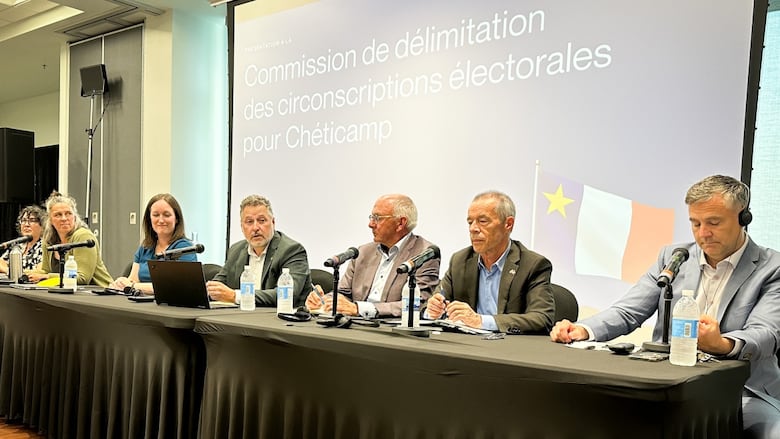Acadians in Chéticamp area a step closer to getting new provincial riding
Electoral boundaries commission presents public options that would cut down Inverness constituency

Nova Scotia's electoral boundaries commission is considering creating a new constituency in the Chéticamp area and if approved by the government, it would become the fourth protected Acadian riding in the province.
Jules Chiasson, who is originally from Chéticamp and is director general of the Fédération acadienne de la Nouvelle-Écosse in Halifax, said the French-speaking people of northern Inverness County deserve their own representative in the legislature.
"We didn't have anybody for the past 100 years, so it's time to give justice to Chéticamp for all the injustice that was done throughout the years," he said Wednesday after a public hearing by the boundaries commission.
He said Chéticamp used to have its own hospital and several banks, service stations and fish plants, and being part of the larger riding of Inverness has hurt the community's economy.
"If we had had an effective representation at the [legislature], I think we could have at least kept some of that economic boom that we had at the time," he said.
"I think we lost all that because nobody was there to speak for Chéticamp."

One presenter said the community landed $85 million worth of lobster and snow crab in the past year, but Chiasson said that money does not get reinvested in the community.
He said that's one economic reason why the region needs its own representative in provincial affairs.
Darlene Doucet said Chéticamp used to have its own large hospital and has had to struggle to keep its long-term care facility in the community.
When those are lost, the community loses access to French-language services, she said.
"We're looking for somebody who can fight for the needs that we have and health care," said Doucet.

The ridings of Argyle, Clare and Richmond have been set aside for Acadians for years and Preston has been designed to ensure effective representation for Black Nova Scotians.
Despite requesting a protected riding since 1992, French-speaking people around Chéticamp have been lumped in with the rest of the Inverness constituency.
Réjean Aucoin argued and won the case for Chéticamp in Nova Scotia Supreme Court last year.
The boundaries commission has since drawn up four possible scenarios for a new Chéticamp riding running from Meat Cove at the northern tip of Inverness to roughly the Margaree Harbour area.
'It's the only possible one'
Aucoin, who's also a senator from Chéticamp and spoke at the boundaries commission hearing this week, said afterward he was only there as a citizen.
But he said the first scenario, whose southern boundary is at Doyle's Bridge on the Margaree River, is the best one.
"Even with [that scenario], we're under 50 per cent electors that speak French, so it's the only possible one," Aucoin said.
"Every other scenario would have like 25 or 30 per cent."

Aucoin said the Margaree River has historically been a physical boundary between the French and English communities.
He said he expects that first scenario will be recommended to the government, with a slight boundary adjustment to include the mountains and Pembroke Lake in the Acadian territory.
"It's going to happen that we will get a riding for the Chéticamp area," Aucoin said. "The only question to decide is where is the south line going to be."
He and others at the hearing also called on the boundary commission to recommend the Acadian riding be made permanent, and asked the commission to recommend the provincial government call a byelection within six months of its final decision.
Several pointed out that the French-speaking population has declined over the years, saying any further delay in creating the riding makes it more difficult to ensure the elected representative is an Acadian.
Boundaries commission chair Ken Deveau said even if a new riding is carved out to include people of Acadian descent, there's no guarantee the elected representative will be Acadian.
He said that's up to political parties, riding associations and voters.

"The hard part in all of this is not the commission's work," Deveau said. "It's what will come after for the people in the community. That's up to the electors after that."
The commission expects an interim report will be available for public comments next month and its final recommendation to the province is due by the end of January.
MORE TOP STORIES

